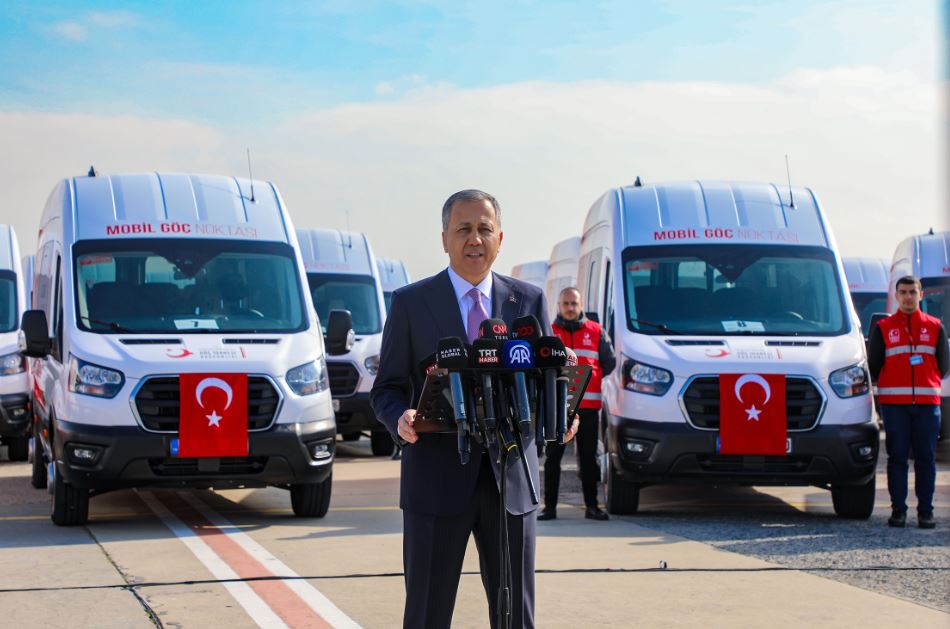Turkey Tightens Immigration Controls: Interior Minister Ali Yerlikaya Highlights New Strategies
Interior Minister Ali Yerlikaya announced that Turkey has conducted thorough address verifications for all foreigners in the country, stating, “We count individually. We know exactly what is happening in Turkey.” Yerlikaya also discussed stopping migration at its source through secure zones established in northern Syria following military operations.
Ali Yerlikaya responded to questions from Sabah Newspaper, offering significant insights into Turkey’s immigration policy.
Detailing the number of foreigners legally residing in Turkey, Yerlikaya noted that there are a total of 4,437,325 foreigners, including 3,103,606 Syrians under temporary protection, 1,109,025 with residence permits, and 224,698 under international protection.
Addressing false claims about the number of Africans in Turkey, Yerlikaya stated it is impossible that there are 2 million Africans in the country. Over the past five years, 6,620,000 Africans arrived, and 6,445,000 left. Of the remainder, 142,423 have residence permits, with 7,302 still within their visa period, leaving 25,109 unaccounted for.
“We are conducting address verifications. We count them individually. We know the exact situation in Turkey,” Yerlikaya said. He added that by September 2023, address verifications had revealed that 731,146 of the 3,103,606 Syrians under temporary protection had outdated address information. “We gave them a 90-day period to update. We sent messages in Arabic and Turkish to ‘Update your address.’ Now 203,978 Syrians have updated their addresses, and 130,430 have made appointments. 396,738 still need to update,” Yerlikaya clarified.
For those who still haven’t updated, a 14-day grace period remains before a 60-day second phase begins, during which another reminder will be sent. “If they still don’t update, public service provision will be suspended,” Yerlikaya added.
The minister also pointed out that 996,000 Syrians have moved to Europe via the Eastern Mediterranean and Western Balkans in the past five years, according to Frontex data. Some Syrians who haven’t updated their addresses may be among those who migrated to Europe.
Regarding new Syrian registrations, Yerlikaya stated, “We have not registered any new Syrians since June 2022.”
On the subject of stopping migration at the source, Yerlikaya said military operations in northern Syria have created secure zones to prevent influx into Turkey. “We stopped migration at the source. We built a 911 km wall, preventing crossings. Over the past year, 132,288 Syrians have returned voluntarily, and 687,706 have done so in the last five years.”
Yerlikaya detailed a five-phase strategy to combat irregular migration, involving source-based solutions, effective border security, domestic capture, fighting irregular labor migration, and an effective deportation mechanism.
Highlighting security investments, Yerlikaya revealed that $950 million (30 billion lira) has been spent on border security so far, with an additional $136 million (4.5 billion lira) allocated for 2024. Measures include 1,253 km of security walls, 1,715 km of patrol roads, 1,282 km of lighting, and various surveillance technologies.
The minister announced that the number of Mobile Immigration Point vehicles, crucial in combating irregular migration, will increase from 268 to 350 this year.
Commenting on regular migration policy, Yerlikaya emphasized appropriate visas and residence permits: “If you come as a tourist, you can’t stay to work as a shepherd. You must apply for a work permit from your home country.”
Meanwhile, a new protocol allows foreigners to apply for residence permits through notaries, reducing lines at immigration offices. International students can now apply for residence permits via university student offices, in line with a protocol signed with the Higher Education Council (YÖK).
Yerlikaya also announced the introduction of fingerprint scanning for entry into Turkey, similar to the US and UK protocols, and the transition to chip-based identity cards for Syrians under temporary protection, stating these will be non-duplicable.
Regarding the misconception that Syrian babies born in Turkey automatically become Turkish citizens, Yerlikaya clarified that this is not the case, unlike the birthright citizenship granted in the US. He noted that 238,733 Syrians have acquired Turkish citizenship over the past 13 years, mainly those who have started businesses or contributed significantly to the workforce.
“TURKEY WILL HAVE NO UNREGISTERED MIGRANTS,” concluded Interior Minister Ali Yerlikaya, emphasizing the details of the updated immigration policy during an exclusive interview with Sabah.
